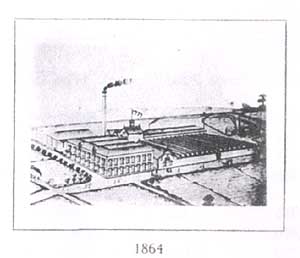
Salomon Jacob Spanjaard is the founder of the trading company S.J. Spaniard. He started out as a merchant in second-hand clothing and other products, such as feathers, old copper and wallpaper. He has a shop, which will be taken over by his son Nathan. Salomon Jacob Spanjaard had a textile factory in Borne. See Factory, sketch 1864, Factory, sketch 1924, Factory, photo 1929, Factory, sketch.
His sons Benjamin and David became grain traders. His youngest son Abraham became a jeweler. His sons Jacob and Levie worked together with Salomon Jacob in his company.
Around 1850 the company specialized in the trade in textiles and in 1852 Jacob and Levie took over the company from their father. The sons of Jacob (Izak, David, Bernard and Alexander) and the sons of Levie (Salomon and Albert Karel) became members of the firm.
In 1864 they modernized the factory and equipped them with steam engines in 1865.
In 1901, the company became a company with capital divided by shares (“private limited company”) and the company was renamed NV Stoom-Spinnerijen en -weveerijen v/h SJ Spanjaard. The four directors became members of the supervisory board. The sons of three of them became directors: (1) James the son of Isaac, (2) Isaac the son of David, (3) Jacob Karel, the son of Bernard.
Jacobus eventually with a sister of Karel. James became very influential in Borne. He was also called the 'God Jacobus eventually married a sister of Karel. Jacobus became very influential in Borne. He was also called the 'God of Borne'. He lived with the factory workers in a kind of love-hate relationship. On the one hand, he had to be tough and formal, especially during strikes, as the factory owners demanded that the factory owners be vehemently against the workers' unions, on the other, James worked through the back door with the workers helping them through the hard times. The Spaniards family had a great influence on the Borne community. The Spanish factory was the largest employer. In the 1940s, the factory had more than 2,000 employees. The products were of high quality and well known in the Netherlands. It produced brands such as Rheumanella sheets and Cinderella sheets, Kenmore shirts and Teddy diapers.
In 1960 the shares of the company were bought by another textile company, Royal Ten Cate. After the Second World War, the textile industry lost its prominent place in Twente’s daily life. In 1974 the factory closes its gates and in 1984 the demolition takes place. Ten Cate survived by focusing on special fibres.
In Borne, the White House as the home of the family is a Monument, the seaside resort and a small remnant of the offices are a reminder of the Spanjaardfabriek and the Spanjaard family.
The Shul, a tombstone and the cemetery also remind us of the Jewish life that the family lived.
See Photogallery for some historical photos (members' section).
